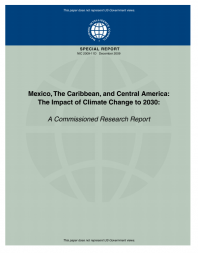
Mexico, The Caribbean, and Central America: The Impact of Climate Change to 2030

The National Intelligence Council sponsors workshops and research with nongovernmental experts to gain knowledge and insights and to sharpen debate on critical issues. The views expressed in this report do not reflect official US Government positions.
Executive Summary (excerpt)
Mexico, the countries of the Caribbean, and Central America examined in this report are at risk from the impacts of climate change in the next 20 years because they will be exposed to a greater range of climate changes and have a relatively weak adaptive capacity when compared to the world at large. Within the region, climate change is evident in increased temperatures, changes in precipitation, and sea level rise—and perhaps in weather variability and natural disaster events. Countries in this report include Belize, Cuba, the Dominican Republic, Guatemala, Haiti, Honduras, Mexico, Nicaragua, and Panama; Puerto Rico is also discussed.
Steady increases within the region in the number of extreme weather events—hurricanes, storms, and droughts—and their effect on infrastructure, public health, loss of human life and agriculture may be attributable to climate change. The countries reviewed do not yet have a full understanding of the potential impacts of future climatic changes and are not prepared to prevent or reduce those impacts.
Regional leaders are aware of these challenges and have begun to make commitments and agreements that will enhance their understanding of future climate change, their own adaptive capacity, and where critical changes and investments need to be made. Leaders have not addressed the problem from a preventive perspective through policy changes or infrastructure investments because of a lack of systematic analysis that quantifies and qualifies the potential impact to the region, allowing the development of relevant and economically viable options. At present the region is still responding to climate change in a reactive manner.
This paper does not represent US Government views.
- Issues:
- Infrastructure, Health, Climate Change
- Regions:
- Caribbean, Central America, Latin America
- Country:
- Mexico
- Year Published:
- 2009
- Institutions:
- Joint Global Change Research Institute, Battelle Memorial Institute, National Intelligence Council (NIC)

